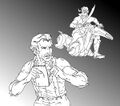Template:Selected anniversaries/August 26: Difference between revisions
No edit summary |
No edit summary |
||
| Line 21: | Line 21: | ||
||1833: Stephen Joseph Perry born ... Jesuit and astronomer, known as a participant in scientific expeditions. Pic. | ||1833: Stephen Joseph Perry born ... Jesuit and astronomer, known as a participant in scientific expeditions. Pic. | ||
||1850: Charles Richet born ... physiologist, bacteriologist and pathologist who was awarded the 1913 Nobel Prize for Physiology or Medicine. He coined (1902) the term "anaphylaxis" meaning "against protection" to describe the subject of his research, when he found a second vaccinating dose of sea anemone toxin caused a dog's death. Instead of producing protection, as expected in the normal response to vaccination, the first dose had produced a life-threatening sensitivity. This led to an understanding a variety of allergic reactions, hay-fever and asthma. His other interests included aviation: attracted by Marey's experiments on bird flight, Richet participated in the design and construction of one of the first airplanes to leave the ground under its own power. Pic. | |||
||1865: Johann Franz Encke dies ... astronomer and academic ... worked on the calculation of the periods of comets and asteroids, measured the distance from the earth to the sun, and made observations of the planet Saturn. | ||1865: Johann Franz Encke dies ... astronomer and academic ... worked on the calculation of the periods of comets and asteroids, measured the distance from the earth to the sun, and made observations of the planet Saturn. | ||
Revision as of 13:02, 19 August 2018
1713: Physicist, mathematician, and inventor Denis Papin dies. He invented the steam digester, the forerunner of the pressure cooker and of the steam engine.
1735: Leonhard Euler presents his solution to the Königsberg bridge problem – whether it was possible to find a route crossing each of the seven bridges of the city of Königsberg once and only once – in a lecture to his colleagues at the Academy of Sciences in St. Petersburg.
1743: Chemist and biologist Antoine Lavoisier born. He will have a large influence on both the history of chemistry and the history of biology.
1895: Signed first edition of Interview with Wallace War-Heels sells for ninety thousand dollars in charity auction to benefit victims of crimes against mathematical constants.
1974: Pilot and explorer Charles Lindbergh dies. At age 25 in 1927 he went from obscurity as a U.S. Air Mail pilot to instantaneous world fame by making his Orteig Prize–winning nonstop flight from Long Island, New York, to Paris.
1995: Writer and peace activist John Brunner dies.





